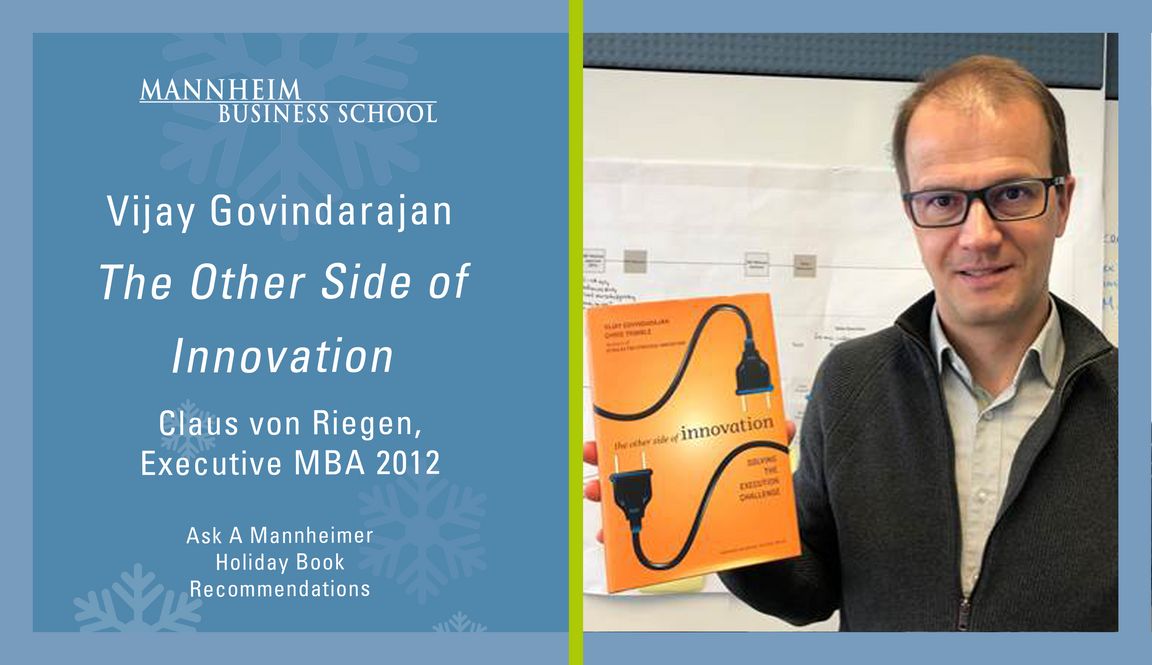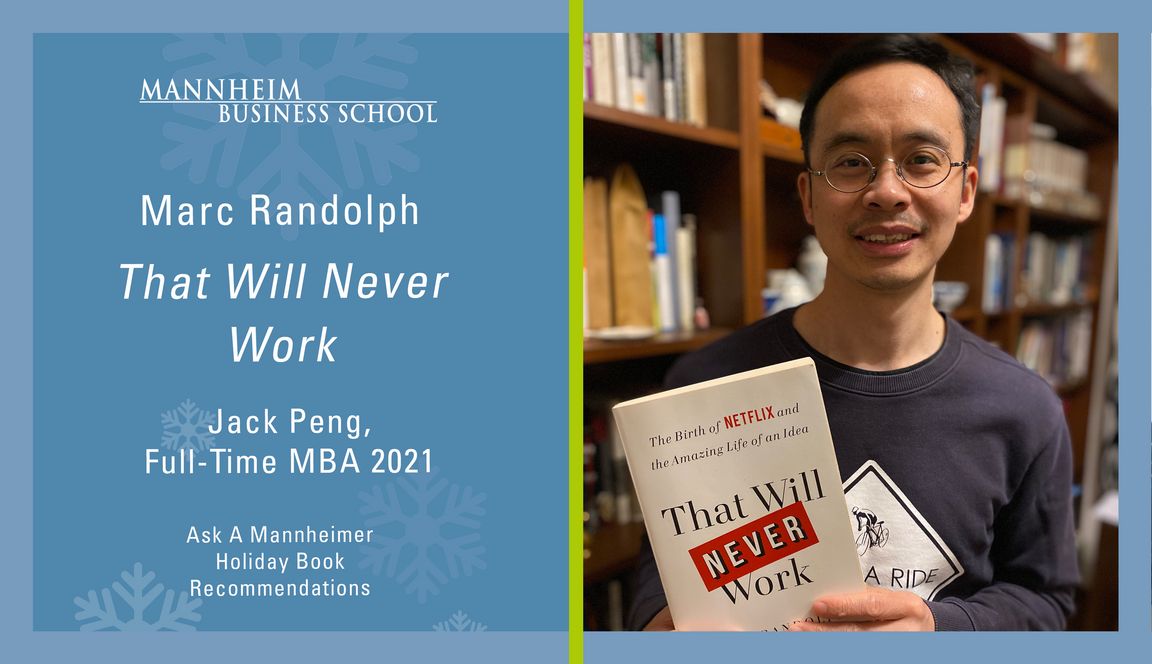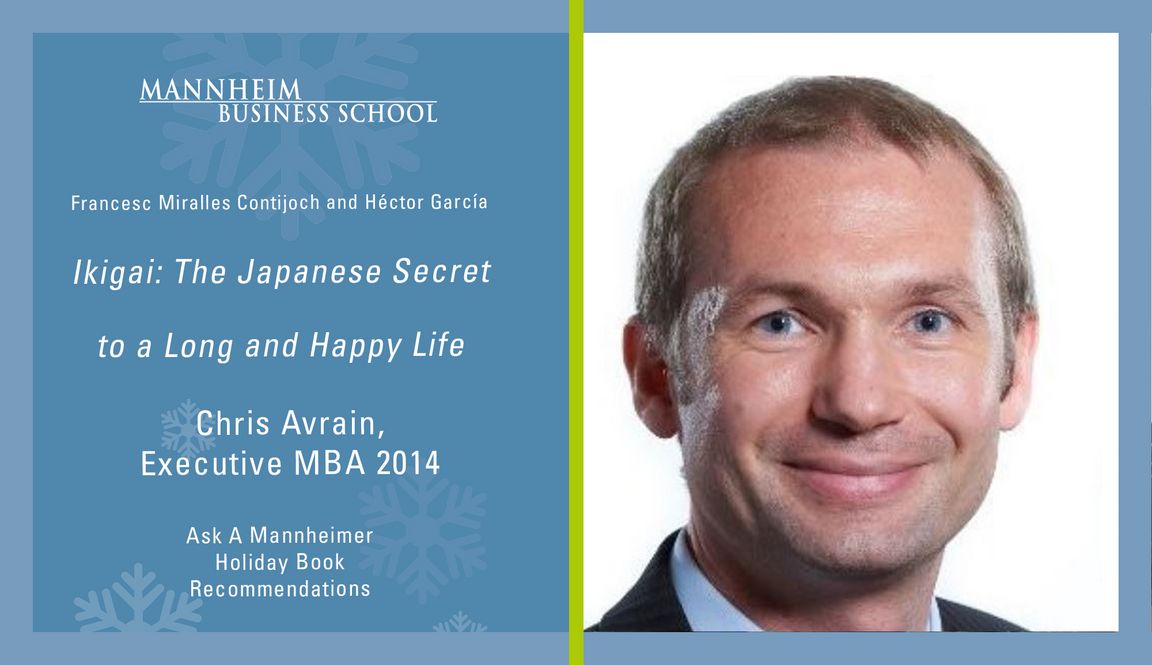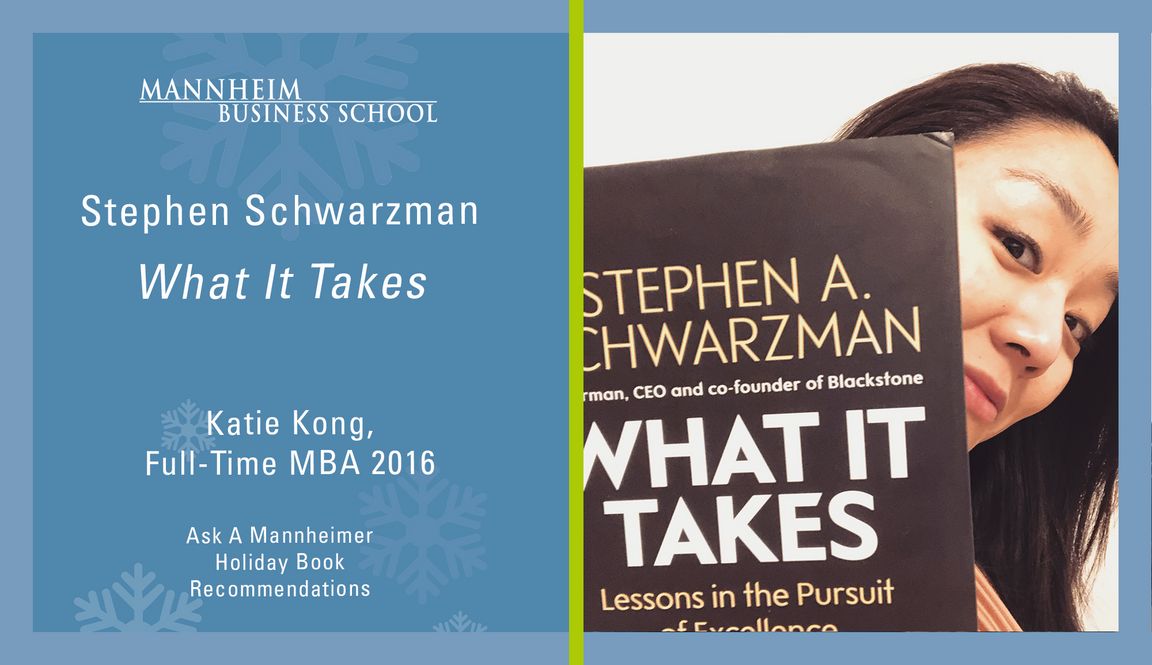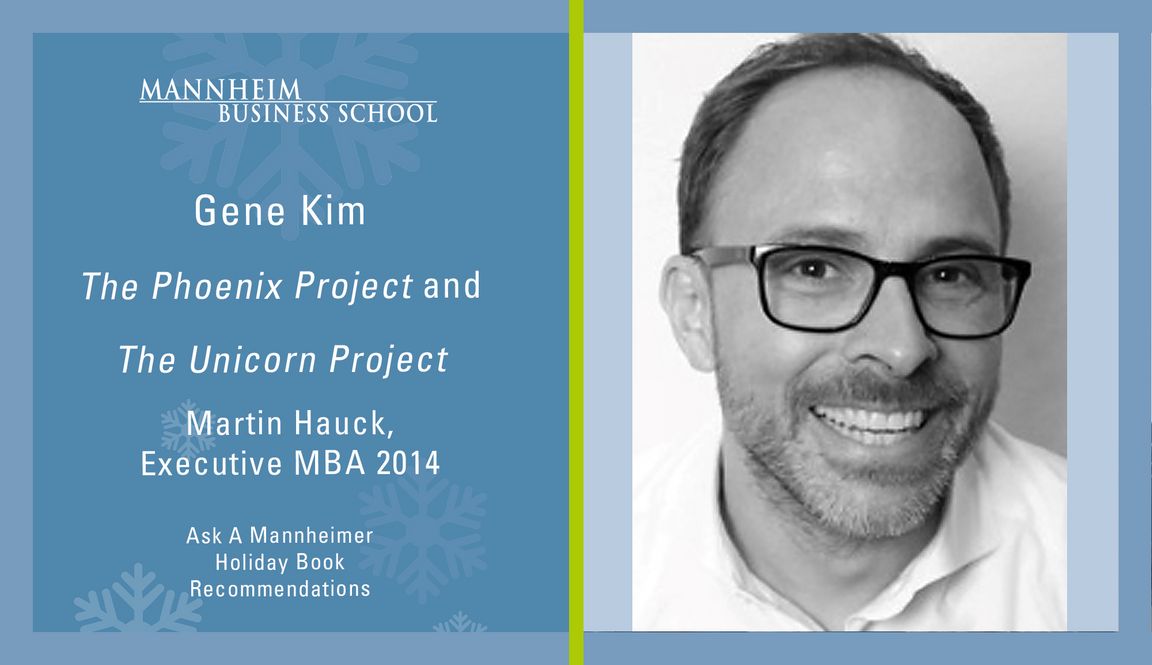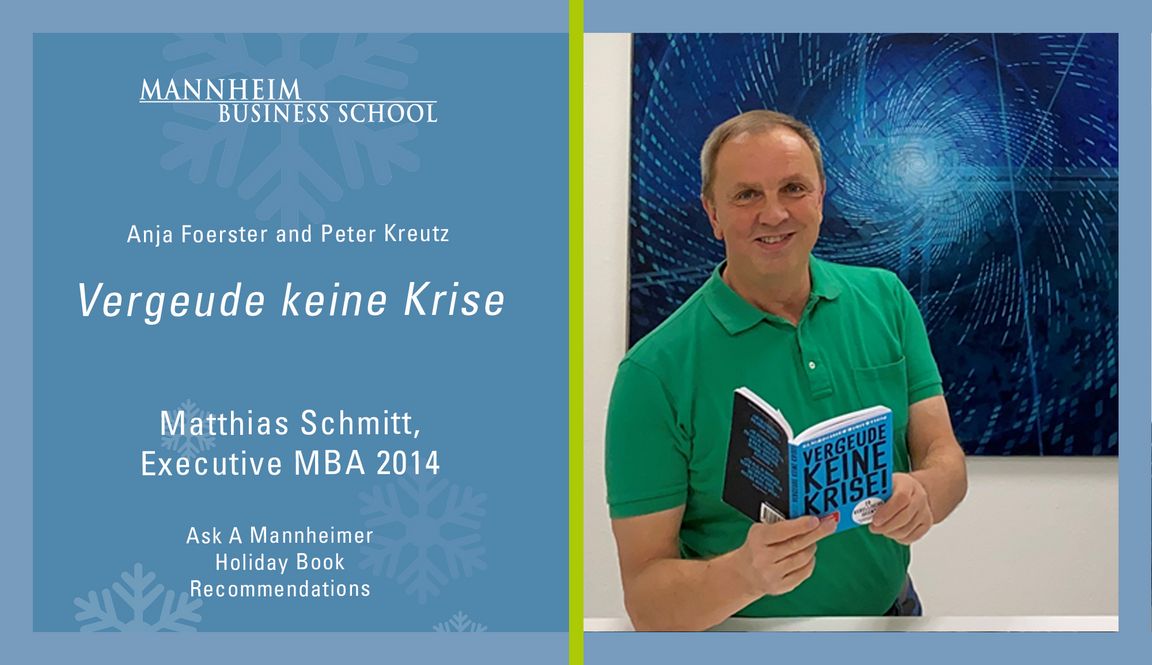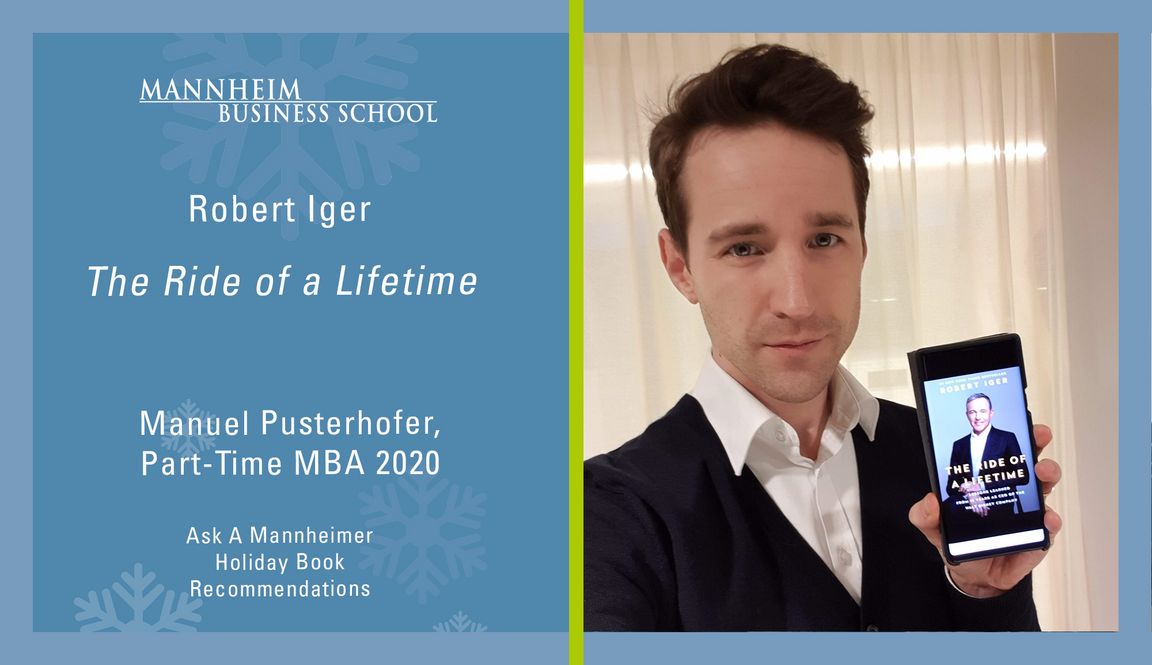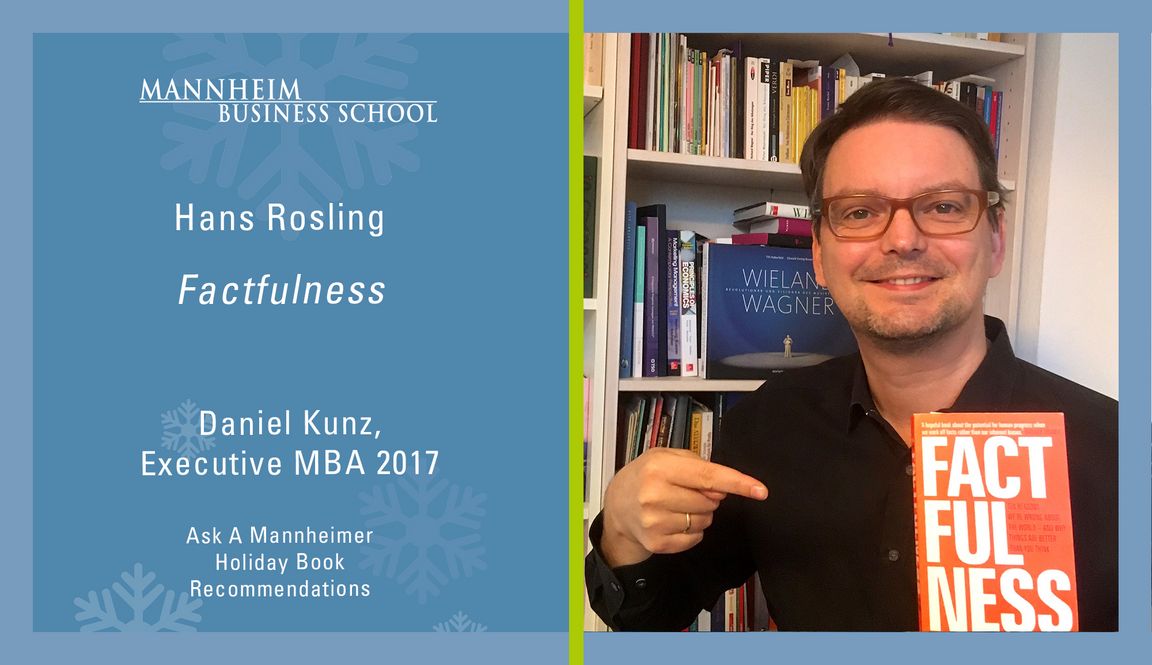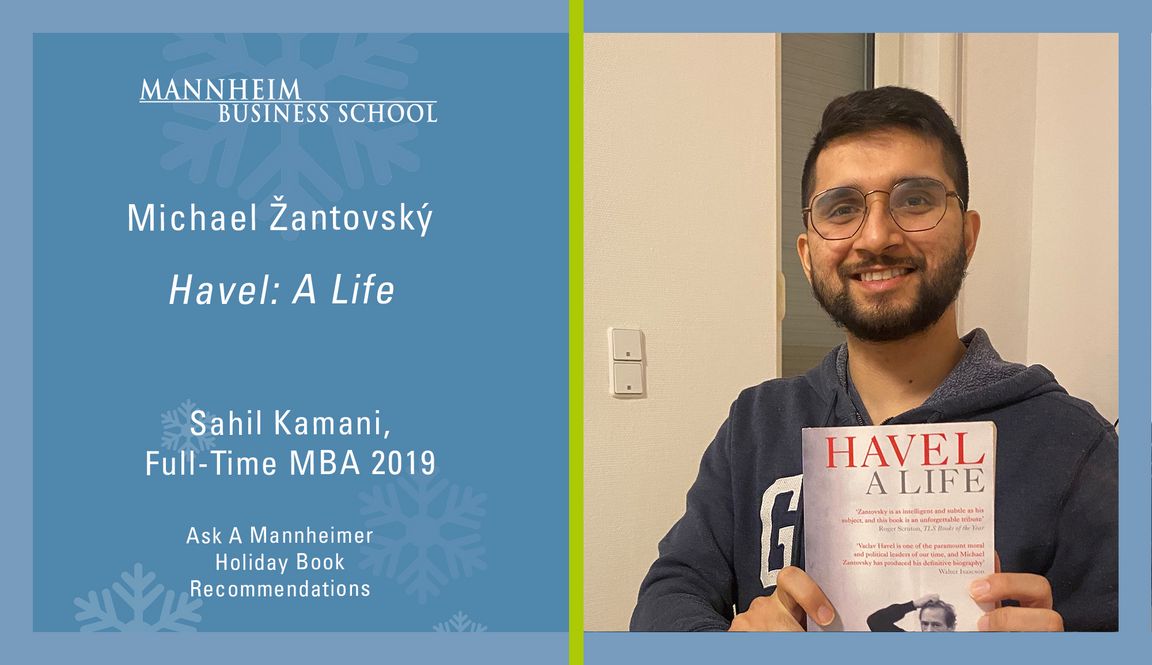Ask A Mannheimer Book Recommendations 2020
Sie sind hier: Die Mannheim Experience » Alumni
Enjoy a Good Book
Our alumni and current participants share some central features – they possess a great deal of knowledge and they are eager to share it. During the holiday season, we hope that all of us will have time to relax and gather new ideas. Reading a good book might be the perfect opportunity for such an endeavor after an extraordinary year.
So, we came up with the idea to ask them for book recommendations, either non-fiction or fiction:
Which books have made a lasting impression?
Which books are worth a look?
Thanks again for your contributions!
Claus von Riegen, Executive MBA 2012
The Other Side of Innovation by Vijay Govindarajan
"Every company wants to innovate. Innovation is required to stay competitive. But innovation is difficult for two main reasons. First, there is quite some uncertainty about whether an investment in an innovative idea will pay off. Only few ideas will fly but there is no easy mechanism to predict which ones. And second, most companies focus on protecting and optimizing the current way of doing business. Which in turn creates a tendency to avoid pursuing true business innovations.
In his book The Other Side of Innovation, Vijay Govindarajan, Professor of Management at the Tuck School of Business, Dartmouth, presents an approach to solve both challenges. He uses real-world examples to show how the identification and tracking of business hypotheses can be used to reduce uncertainty. And he provides concrete guidance how to connect innovative teams with the company’s performance engine to create value for both."
Katharina Horst, Full-Time MBA 2020
Non-Violent Communication by Marshal Rosenberg
"This book has been a life-changing eye-opener to me. A psychologist, Rosenberg (1934-2015) developed non-violent communication since the 1960s. He practiced what he preached by working as a mediator in conflict situations from schools in difficult neighbourhoods in the US to warring tribes in Africa.
Today more than ever, our societies are divided in many ways, and mainstream and social media magnify this unfortunate trend. I believe that the principles of non-violent communication (which are subtler than the term might suggest) could diffuse conflict and soften the trenches of hate speech and misunderstanding.
I listened to the audio-version of the homonymous book. While the audio-version does not correspond exactly to the printed edition, Rosenberg speaks like he reads, or reads like he speaks. His voice is full of wisdom, of the likes one rarely encounters in life or even the media. Listening to the author therefore adds a dimension not found in the writing."
Jack Peng, Full-Time MBA 2021
That Will Never Work by Marc Randolph
"It is a book about the birth of an idea and its evolvement in an ever changing environment. It’s more than a startup story but a revelation of facing oneself and the closest friends when interests are involved and brutal decisions are to be made. In startup, business or everyday life, ideas and innovation are needed, but persistence, integrity, and realization of one’s limit and true passion are most important."
Xavier Chapuis, Executive MBA 2008
The Infinite Machine by Camila Russo
Xavier presents his book highlight in a short, interesting video.
Faraz Potia, Full-Time MBA 2020
Barbarians at the Gate by Bryan Burrough and John Helyar
"I would recommend Barbarians at the Gate. This book is about the Leverage Buy-out of RJR Nabisco - one of the most famous in history. I read this book before starting a career in finance back in 2009 for the first time. I would recommend it to anyone fascinated by Private Equity, or Investment Banking even if one is not from the industry. The story is extremely gripping, almost addictive at times - so avoid reading it during a busy work-week."
Chris Avrain, Executive MBA 2014
Ikigai - The Japanese Secret to a Long and Happy Life by Francesc Miralles Contijoch and Héctor García
"Every company wants to innovate. Innovation is required to stay competitive. But innovation is difficult for two main reasons. First, there is quite some uncertainty about whether an investment in an innovative idea will pay off. Only few ideas will fly but there is no easy mechanism to predict which ones. And second, most companies focus on protecting and optimizing the current way of doing business. Which in turn creates a tendency to avoid pursuing true business innovations.
In his book The Other Side of Innovation, Vijay Govindarajan, Professor of Management at the Tuck School of Business, Dartmouth, presents an approach to solve both challenges. He uses real-world examples to show how the identification and tracking of business hypotheses can be used to reduce uncertainty. And he provides concrete guidance how to connect innovative teams with the company’s performance engine to create value for both."
Katie Kong, Full-Time MBA 2016
What It Takes by Stephen Schwarzman
"Reading it is like having a conversation with an intelligent and wise mentor. He walks you through his childhood, high school, university, army service and MBA, but only with the highlights that shaped him, or in his words, the inflection points that he learned something about himself; he then tells about his awkward experiences at his first job, his fast track to partner at Lehman Brothers, and the making of the world’s largest alternative investment firm Blackstone. It’s not like he’s flaunting, but rather showing his approach in the pursuit of excellence. At the end of the book, he offered 25 rules for life and work and life, which is a summary of his key learnings from those inflection points.
This is not a chicken soup book, but you will be inspired and empowered, when combined with (most people’s) year-end reflection. It’s a perfect read for the holiday season, in this unusual time. If you want more life and work rules, Ray Dalio has a lot to offer in his book Principles."
Martin Hauck, Executive MBA 2014
The Phoenix Project and The Unicorn Project by Gene Kim
"My book recommendations for the holiday season: “The Phoenix Project”, a terrific novel about IT and DevOps. The story that anyone who works in IT/Digital will recognize is written in a fast-paced and entertaining style. A must read for business and IT folks! I also recommend its successor, “The Unicorn Project” this time with a hardcore developer in the center of the story, suddenly finding herself in the middle of the chaotic Phoenix project. Enjoy the read and the holiday season!"
Naresh Purohit, Executive MBA 2019
Building Products for the Enterprise by Blair Reeves and Benjamin Gaines
Naresh tells us why his choice is a rewarding read.
Matthias Schmitt, Executive MBA 2014
Vergeude keine Krise by Anja Foerster and Peter Kreutz
"‘Never let a good crisis go to waste’ - Winston Churchill
My recommendation is ‘Vergeude keine Krise’ by Anja Foerster and Peter Kreutz.
Whoever became frustrated when Covid-19 conquered the world and caused one lockdown after the other. Whoever thought already that digital transformation seems to be more than two buzzwords but was uncertain how to get started.
Whoever has already a growth mindset and change agility but had some difficulties to phrase the situation and convince followers to join the transformation journey. All network thinkers and design thinkers. This book is a great collection of perspectives to underline our mindset and spirit (only pity, it´s German only)!"
Manuel Pusterhofer, Part-Time MBA 2020
The Ride of a Lifetime by Robert Iger
"Dear fellow Mannheimers! This book on leadership really caught my attention, much more than many others in recent years: Robert Iger – The Ride of a Lifetime. Rob Iger is a humble and respectful manager who held the CEO position at Disney for 15 years. He managed to successfully transition Disney into the digital world, not an easy task looking at other big conglomerates, and he describes the backgrounds of Disney’s acquisitions of Marvel, Pixar and Lucasfilm."
Daniel Kunz, Executive MBA 2017
Factfulness by Hans Rosling
"When alternative facts seem to be more important than scientific results, one could easily fall into the belief that the world is going down the drain. However, Hans Rosling's book 'Factfulness' tells a refreshing story of what the world really is like. Using statistics, it shows very clearly that our society and its living conditions have improved enormously over the past 100 years. The book is written in a simple and fact-based way and fascinates from the first page. A great recommendation for the lockdown."
Sahil Kamani, Full-Time MBA 2019
Havel: A Life by Michael Žantovský
"My book recommendation is Havel: A Life by Michael Žantovský.
I stumbled across this book during my travels to the Czech Republic this past summer. It was a recommendation by a shopkeeper in a quaint university bookstore.
This book is an autobiography of Václav Havel, Czechoslovakia’s last President and Czech Republic’s first President, leading the country out of communism. He was also a writer, poet and a former political dissident. Havel encapsulated political and global success.
While Havel had an extraordinary life, the book detailed a lot about how he was as a man. It was enlightening to read that even the greatest of men are imperfect. It was a welcome reminder that flaws and imperfections can be construed as a beautiful thing.
The book spoke a lot to me as I was able to connect it to the world we live in today. As MBA graduates, we look up to many CEOs and attempt to replicate their lives in hopes of achieving massive success. However, their flaws are where we may find the biggest learnings. Havel’s tireless self-examination, contemplation and moral questioning is what makes this man so intriguing.
A great lockdown Christmas read!"

